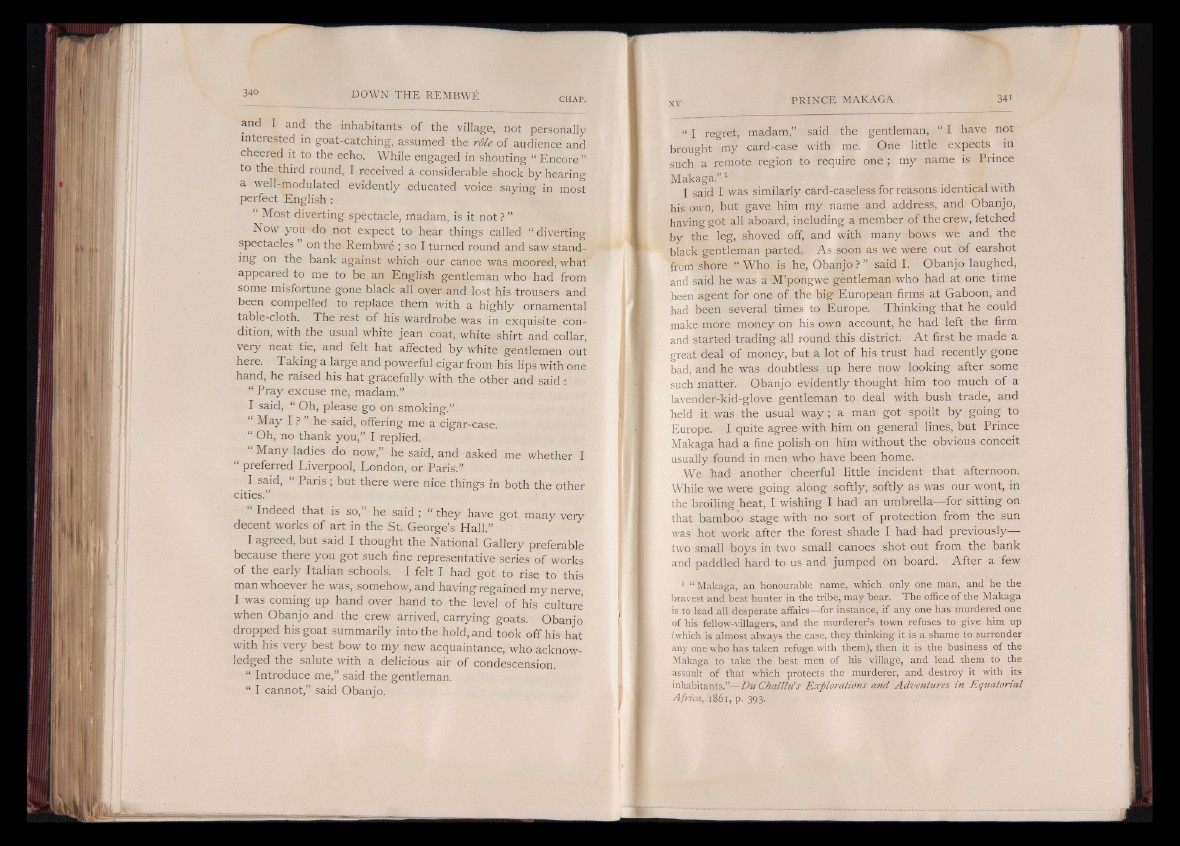
and I and the inhabitants of the village, not personally
interested in goat-catching, assumed the rdle of audience and
cheered it to the echo. While engaged in shouting “ Encore ”
to the third round, I received a considerable shock by hearing
a well-modulated evidently educated voice saying in most
perfect English :
“ Most diverting spectacle, madam, is it not ? ”
Now you do not expect to hear things called “ diverting
spectacles ” on the Rembwd ; so I turned round and saw standing
on the bank against which our canoe was moored, what
appeared to me to be an English gentleman who had from
some misfortune gone black all over and lost his trousers and
been compelled to replace them with a highly ornamental
table-cloth. The rest of his wardrobe was in excjuisite condition,
with the usual white jean coat, white shirt and collar,
very neat tie, and felt hat affected by white gentlemen out
here. Taking a large and powerful cigar from his lips with one
hand, he raised his hat gracefully with the other and said :
“ Pray excuse me, madam.”
I said, “ Oh, please go on smoking.”
“ May I ? ” he said, offering me a cigar-case.
“ Oh, no thank you,” I replied.
“ Many ladies do now,” he said, and asked me whether I
“ preferred Liverpool, London, or Paris.”
I said, “ Paris ; but there were nice things in both the other
cities.”
Indeed that is so, he said; “ they have got many very
decent works of art in the St. George’s Hall.”
I agreed, but said I thought the National Gallery preferable
because there you got such fine representative series of works
of the early Italian schools. I felt I had got to rise to this
man whoever he was, somehow, and having regained my nerve
I was coming up hand over hand to the level of his culture
when Obanjo and the crew arrived, carrying goats. Obanjo
dropped his goat summarily into the hold, and took off his hat
with his very best bow to my new acquaintance, who acknowledged
the salute with a delicious air of condescension
“ Introduce me,” said the gentleman.
“ I cannot,” said Obanjo.
“ I regret, madam,” said the gentleman, 11 have not
brought my card-case with me. One little expects in
such a remote region to require one ; my name is Prince
Makaga.” 1 ' y .
I said I was similarly card-caseless for reasons identical with
his own, but gave him my name and address, and Obanjo,
having got all aboard, including a member of the crew, fetched
by the leg, shoved off, and with many bows we and the
black gentleman parted. As soon as we were out of earshot
from1 shore “ Who is he, Obanjo?” said I. Obanjo laughed,
and said he was a M’pongwe gentleman who had at one time
been agent for one of the big European firms at Gaboon, and
had been several times to Europe. Thinking that he could
make more money on his own account, he had left the firm
and started trading all round this district. A t first he made a
great deal of money, but a lot of his trust had recently gone
bad, and he was doubtless up here now looking after some
such matter. Obanjo evidently thought him too much of a
lavender-kid-glove gentleman to deal with bush trade, and
held it was the usual way ; a man got spoilt by going to
Europe. I quite agree with him on general lines, but Prince
Makaga had a fine polish on him without the obvious conceit
usually found in men who have been home.
We had another cheerful little incident that afternoon.
While we were going along softly, softly as was our wont, in
the broiling heat, I wishing I had an umbrella— for sitting on
that bamboo stage with no sort of protection from the sun
was hot work after the forest shade I had had previously—
two small boys in two small canoes shot out from the bank
and paddled hard to us and jumped on board. After a few
1 “ Makaga, an honourable name, which only one man, and he the
bravest and best hunter in the tribe, may bear. The office of the Makaga
is to lead all desperate affairs—for instance, if any one has murdered one
of his fellow-villagers, and the murderer’s town refuses to give him up
(which is almost always the case, they thinking it is a shame to surrender
any one who has taken refuge with them), then it is the business of the
Makaga to take the best men of his village, and lead them to the
assault of that which protects the murderer, and destroy it with its
inhabitants.”—Du Chailliis Explorations and Adventures in Equatorial
Africa, 1861, p. 393.